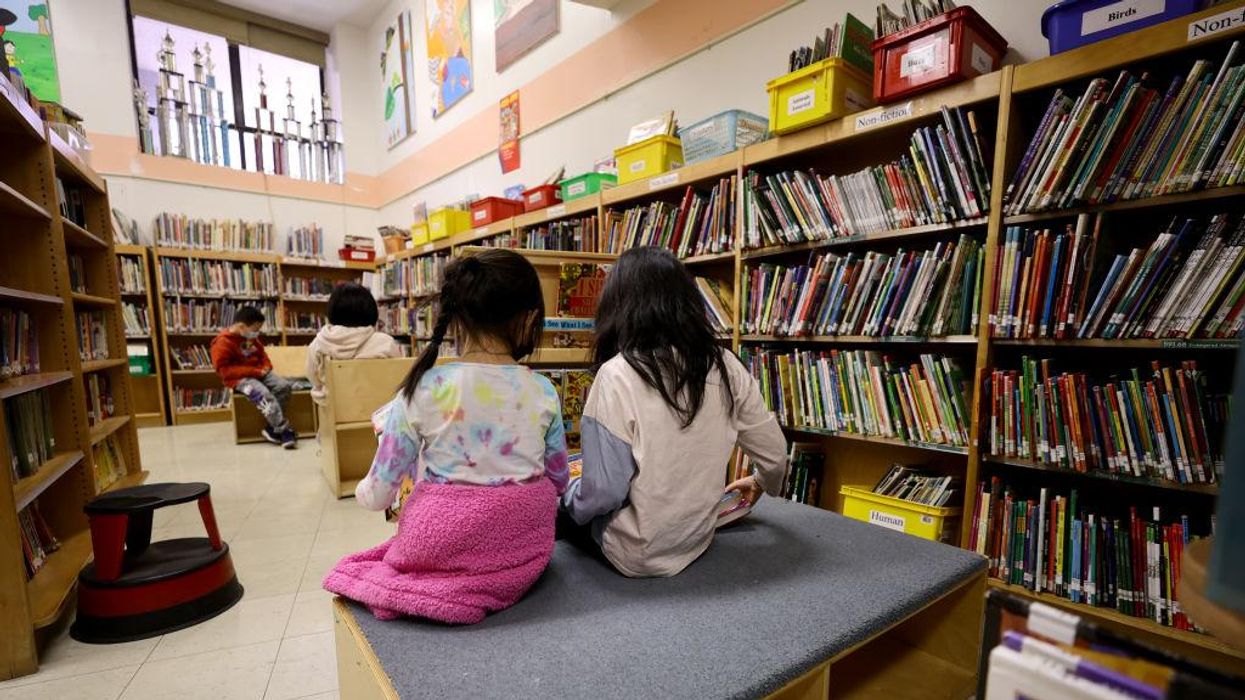
Photo by Michael Loccisano/Getty Images

Arizona Gov. Doug Ducey approved Republican Rep. Jake Hoffman's proposed House Bill 2495 on July 6. It went into effect this past weekend, meaning public schools in the state can no longer subject students to pornography.
While some opponents of the bill suggested that by preventing children from engaging with works depicting sodomy, masturbation, oral sex, and other sex acts, Arizona Republicans have effectively censored "LGBTQ+ stories," Hoffman underlined that his objective, now realized, was the protection of "kids from sexually explicit material."
The law prohibits children's use of or referral to textual, visual, or audio materials that contain graphic depictions — literal or simulated — of sexual conduct, sexual excitement, or sexual acts (e.g., normal sex, sodomy, and masturbation).
Notwithstanding suggestions from early critics of the bill that kids would be precluded from reading books like "The Canterbury Tales," the bill states that materials may be exempted if they possess serious educational value for minors or possess serious literary, artistic, political or scientific value. Exempted material can be used and referenced on the condition that the school obtains parental consent in advance.
In the event that exempted material is the subject of an assignment or curricular learning and parental consent is not secured, an alternative assignment not containing explicit material must be provided.
Lisa Fink, the president of the Protect Arizona Children Coalition and supporter of the bill, identified a book that had been in circulation in Maricopa County libraries, which would qualify for removal. "Beyond Magenta," a book about transsexual teens, reportedly features "descriptions of children performing sex acts with adults."
Republican Rep. Jake Hoffman introduced the bill, keen not to hamper lessons on human anatomy (he indicated biology can still be taught), but rather to shield children from "the same types of materials that are currently prohibited under our criminal code."
When arguing for his law, Hoffman cited a National Institute for Health study, which suggested exposure to sexually explicit material was dangerous for children and resulted in adverse outcomes.
Corresponding with his campaign to see the bill through the state house, there was a campaign to "stop sexual grooming in Arizona schools."
Whereas some supporters of the bill characterized the fight as one against the sexualization of minors, Democratic state Rep. Daniel Hernandez suggested the dual effect of the law would be an end to the promotion of a "homosexual lifestyle" and a resuscitation of the so called "no promo homo" law repealed in 2019.
Hoffman said Hernandez had mischaracterized the bill. Depictions of homosexuality are not prohibited, but as in the case with depictions of straight sex, "the act of homosexuality, so the act of sexual intercourse between two people of the same gender," would be prohibited.
State Sen. Christine March (D) said the bill might prove a "logistical and bookkeeping nightmare for teachers," who might altogether avoid teaching books with sexually graphic material.
The gay and transsexual activist group Equality Arizona suggested in March that the bill would "censor LGBTQ+ stories from both history and literature."
The group condemned the law, suggesting it pares "education down to nothing more than 'reading, writing, and arithmetic'."
One of the group's members, activist Gaelle Esposito, stated: "We're very concerned about the impact that this ... would have on teachers and students who are trying to access new materials that reflect their perspective."
He noted further that "It's unclear what the consequences are for a teacher that violates the statute and what they may face."
Jeanne Casteen, executive director of Secular AZ, claimed that the law's prohibition of pornography in schools constituted a "whitewashing of literature." She intimated further that much would be lost by no longer being able to share books containing characters navigating their sexuality with students, "when the magic really happens."
Arizona Education Association President Marisol Garcia told KPHO, "There's just no reason why policy makers should be passing these types of laws."
There have been a number of recent initiatives taken across the U.S. to protect American children from sexually graphic content and overt sexualization.
On August 2, residents of Jamestown Township, Michigan, overwhelmingly voted "no" to a 10-year millage renewal and increase for the Patmos Library, largely over its inclusion of alleged LGBT pornography in its catalog.
Missouri's Senate Bill 775 went into effect on August 28, prohibiting sexually explicit materials in both public and private schools.
On March 28, Republican Florida Gov. Ron DeSantis signed the "Parental Rights in Education" bill into law, reinforcing parents' rights to make decisions regarding the upbringing of their children. It also prohibits classroom instruction on sexual orientation or gender identity in kindergarten through 3rd grade, along with the dissemination of age inappropriate materials.
Utah's House Bill 374, signed into law by Gov. Spencer Cox (R) on March 24, prohibits sensitive materials in public schools.